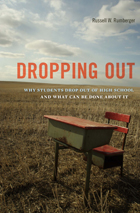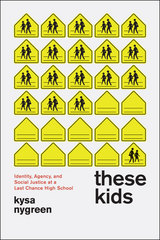
The vast majority of kids in the developed world finish high school—but not in the United States. More than a million kids drop out every year, around 7,000 a day, and the numbers are rising. Dropping Out offers a comprehensive overview by one of the country’s leading experts, and provides answers to fundamental questions: Who drops out, and why? What happens to them when they do? How can we prevent at-risk kids from short-circuiting their futures?
Students start disengaging long before they get to high school, and the consequences are severe—not just for individuals but for the larger society and economy. Dropouts never catch up with high school graduates on any measure. They are less likely to find work at all, and more likely to live in poverty, commit crimes, and suffer health problems. Even life expectancy for dropouts is shorter by seven years than for those who earn a diploma.
Russell Rumberger advocates targeting the most vulnerable students as far back as the early elementary grades. And he levels sharp criticism at the conventional definition of success as readiness for college. He argues that high schools must offer all students what they need to succeed in the workplace and independent adult life. A more flexible and practical definition of achievement—one in which a high school education does not simply qualify you for more school—can make school make sense to young people. And maybe keep them there.

While high school drop-out rates have steadily declined among white and African American students over the 1970s and 1980s a constant 35 percent of Latino students continued to quit school before graduation. In this pioneering work, Harriett Romo and Toni Falbo reveal how a group of at-risk Latino students defied the odds and earned a high school diploma.
Romo and Falbo tracked the progress of 100 students in Austin, Texas, from 1989 to 1993. Drawing on interviews with the students and their parents, school records, and fieldwork in the schools and communities, the authors identify both the obstacles that caused many students to drop out and the successful strategies that other students and their parents pursued to ensure high school graduation.
The authors conclude with seven far-reaching recommendations for changes in the public schools. Sure to provoke debate among all school constituencies, this book will be required reading for school administrators, teachers, parents, legislators, and community leaders.

READERS
Browse our collection.
PUBLISHERS
See BiblioVault's publisher services.
STUDENT SERVICES
Files for college accessibility offices.
UChicago Accessibility Resources
home | accessibility | search | about | contact us
BiblioVault ® 2001 - 2024
The University of Chicago Press









